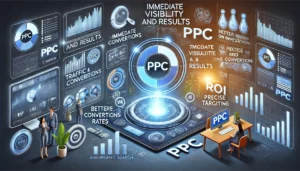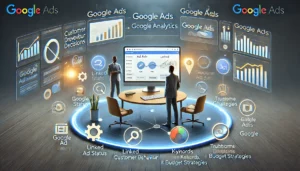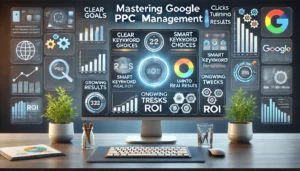Maximising ROI: A Comprehensive Guide to Google PPC Management

Google PPC management is all about getting the best results from your ads on Google. By planning, creating, and optimising your campaigns, you can attract the right people and turn them into customers. This guide will help you understand the basics, set up your account, choose the best keywords, write great ads, and make smart decisions to get the most out of your budget.
Key Takeaways for Google PPC Management
- Learn the fundamentals of Google PPC management to start your campaigns right.
- Set up your Google Ads account to ensure a smooth start and effective tracking.
- Discover how to find and choose the best keywords for your ads.
- Write compelling ad copy that grabs attention and drives clicks.
- Optimise your campaigns continuously to maximise your return on investment.
Understanding the Basics of Google PPC Management
What is Google PPC?
Google ads PPC, or Pay-Per-Click, is an online advertising model where advertisers pay each time a user clicks on their ad. This method allows businesses to bid for ad placement in a search engine’s sponsored links when someone searches on a keyword related to their business. It’s a cost-effective way to drive traffic to your website.
Key Components of a PPC Campaign
A successful Google Adwords PPC campaign includes several key components:
- Keywords: Selecting the right keywords is crucial. These are the terms your potential customers are searching for.
- Ad Copy: Crafting compelling ad text that attracts clicks.
- Landing Pages: Ensuring the page users land on is relevant and optimised for conversions.
- Bidding: Setting the right bid amount to ensure your ads are competitive.
- Targeting: Using demographic and geographic data to reach the right audience.
Why PPC is Essential for Businesses
PPC management is vital for businesses because it offers immediate visibility and results. Unlike organic search, which can take months to show results, PPC ads can start driving traffic and conversions as soon as they go live. Additionally, PPC allows for precise targeting, ensuring your ads reach the most relevant audience. This leads to higher conversion rates and a better return on investment (ROI).
Setting Up Your Google Ads Account for Success
Creating a Google Ads Account
The foundation of successful Google Ads campaigns lies in its account structure. A well-organised account allows for precise targeting and efficient management, which are critical for maximising your return on investment (ROI). Begin by choosing the right type of account for your needs. An individual account may suffice for personal projects or small businesses, while a business account provides additional features that benefit organisations with more extensive Google PPC advertising needs.
Configuring Account Settings
When setting up your account, consider the following points:
- Access Control: Define user roles and permissions to ensure security and collaboration.
- Billing and Invoicing: Business accounts offer more flexibility, which is beneficial for complex financial structures.
- Hierarchy Limit: Be aware of the limit to the hierarchy of manager accounts to avoid navigation issues.
Linking Google Analytics
It’s essential to link your Google Ads account with Google Analytics for a comprehensive view of customer behaviour. Remember, a disorganised account can lead to troubleshooting challenges, such as ads not showing. To prevent this, regularly check account info, ad status, and keywords, and ensure proper budget and bidding strategies are in place. Use tools like the Google Ad Preview Tool for an accurate assessment of your ads’ visibility.
Linking your Google Ads account with Google Analytics provides a comprehensive view of customer behavior, which is crucial for making data-driven decisions.
Effective Keyword Research and Selection
Keyword research is the backbone of any successful PPC campaign. It involves identifying the terms and phrases that potential customers use when searching for services or products similar to what you offer. Conduct thorough keyword research to find high-value keywords relevant to your business. Focus on long-tail keywords that have lower competition and higher conversion potential. Regularly review and refine your keyword list to eliminate irrelevant or underperforming keywords. Utilise keyword match types (broad match, phrase match, exact match) effectively to control ad visibility and costs.
Tools for Keyword Research
Use keyword research tools like Google Keyword Planner or SEMrush to discover the keywords your target audience is searching for. These tools provide valuable insights into search volume, competition level, and cost-per-click (CPC) for each keyword. Consider incorporating keywords from social media platforms or shopping engines into your research for a more holistic approach.
Identifying High-Intent Keywords
Prioritise keywords that align with your goals, budget, and target audience. Analyse the search volume, competition level, and CPC for each keyword. High-intent keywords are those that indicate a strong likelihood of conversion. By focusing on these, you can drive more qualified traffic to your site.
Organising Keywords into Ad Groups
Organise your keywords into tightly themed ad groups. This helps in creating more relevant ads and landing pages, which can improve your Quality Score and lower your cost-per-click. Grouping keywords by theme or product category ensures that your ads are highly relevant to the search queries they match. This dynamic approach to keyword management enables you to adapt your strategy in response to changes in search trends and campaign performance.
Crafting Compelling Ad Copy (Google PPC Management)
Creating ad copy that stands out is crucial in the crowded digital space. Your ad copy is often the first impression potential customers have of your brand, so it needs to be both persuasive and informative. Here are some key elements to focus on:
Writing Attention-Grabbing Headlines
Your headline is the first thing people see, so make it count. It should be clear, concise, and compelling. Including relevant keywords can improve your ad’s relevance and attract the right audience. A strong headline can significantly increase your click-through rate (CTR).
Incorporating Keywords into Ad Text
Incorporating keywords into your ad text is essential for improving your ad’s visibility and relevance. Use keywords naturally within the ad copy to ensure it reads well and resonates with your audience. Avoid keyword stuffing, as it can make your ad look spammy and reduce its effectiveness.
Using Ad Extensions to Enhance Visibility
Ad extensions provide additional information and can significantly improve your ad’s performance. They can include site links, call buttons, or additional text, making your ad more informative and engaging. Utilising ad extensions can lead to higher engagement and better ROI.
Remember, the goal of your ad copy is to capture attention and drive action. Keep it clear, concise, and focused on the needs of your audience.
Optimising Your PPC Campaigns for Maximum ROI
Optimising your PPC campaigns is crucial for achieving the best return on investment (ROI). By focusing on key areas such as bid adjustments, ad variations, and performance metrics, you can ensure your campaigns are running efficiently and effectively.
Leveraging Advanced Targeting Options
Audience Targeting Techniques
To maximise your ROI, it’s essential to segment your audience based on demographics, interests, and online behaviour. By doing so, you can create targeted campaigns that speak directly to different segments of your audience. This tailored approach ensures your messaging and offers have the maximum impact.
Geotargeting Strategies
Location targeting allows you to focus your ads on specific geographic areas relevant to your business. This means you can reach potential customers who are actively searching for products or services in your area. By narrowing down your audience geographically, you can increase the likelihood of conversions.
Remarketing Campaigns
Remarketing is a powerful tool to capture the attention of users who have previously interacted with your brand but haven’t converted yet. Retarget these users with relevant ads across the web, reminding them of your offerings and enticing them to return. This strategy helps businesses increase their conversions by reaching an audience that is most likely to interact with their message.
Don’t forget to leverage conversion data to identify high-value users and potential remarketing opportunities. This data is crucial for crafting targeted campaigns that resonate with your audience and ultimately, for maximising your ROI.
Utilising Conversion Tracking and Analytics
Setting Up Conversion Tracking (Google PPC Management)
Setting up conversion tracking is crucial for understanding what happens after a user clicks on your ad. This involves tracking actions like purchases, sign-ups, and phone calls. Conversion tracking helps you measure the effectiveness of your campaigns and provides insights into customer behaviour.
Interpreting Analytics Data
Once you have conversion tracking in place, the next step is to interpret the data. Use Google Analytics to gain valuable insights into user behaviour. Look for patterns and trends that can help you refine your campaigns.
Making Data-Driven Decisions
With the data you’ve gathered, you can make informed decisions to optimise your campaigns. This might involve adjusting your bids, changing your ad copy, or targeting different keywords. The goal is to continuously improve your ROI by making data-driven decisions.
Remember, conversion tracking is not just about counting conversions; it’s about gaining insights into customer behavior and optimising your campaigns for better performance.
Budget Management and Bid Strategies
Setting a Realistic Budget
Establishing a realistic budget is the cornerstone of any successful PPC campaign. Start by assessing your overall marketing budget and determining how much you can allocate to Google Ads. It’s crucial to balance your spend with your expected returns. Use historical data and industry benchmarks to set a budget that aligns with your business goals.
Choosing the Right Bid Strategy
Selecting the appropriate bid strategy can significantly impact your campaign’s performance. Google Ads offers various bidding options, including manual and automated strategies. Manual bidding gives you full control but requires constant monitoring. Automated bidding, like Target CPA or Target ROAS, leverages machine learning to optimise bids based on your campaign goals. Choose a strategy that fits your expertise and campaign objectives.
Allocating Budget Across Campaigns
Distributing your budget effectively across different campaigns is essential for maximising ROI. Prioritise high-performing campaigns and allocate more funds to them. Consider seasonal trends and market conditions when adjusting your budget. A well-balanced budget allocation ensures that all your campaigns have the resources they need to succeed.
Effective budget management and strategic bidding are key to maximising your PPC campaign’s ROI. By setting a realistic budget, choosing the right bid strategy, and allocating funds wisely, you can achieve your marketing goals more efficiently.
Conclusion
In wrapping up, mastering Google PPC management is key to getting the most out of your advertising dollars. By focusing on clear goals, smart keyword choices, and ongoing tweaks, you can make sure your ads hit the mark. Remember, it’s not just about getting clicks—it’s about turning those clicks into real results for your business. Keep learning, stay flexible, and watch your ROI grow.
Frequently Asked Questions for Google PPC Management
What is Google PPC and how does it work?
Google PPC (Pay-Per-Click) is a way to advertise on Google. You create ads, choose keywords, and pay each time someone clicks on your ad. It helps bring more visitors to your website.
How much does Google PPC cost?
The cost of Google PPC can vary. It depends on how much you bid for keywords and how competitive those keywords are. You can set a budget to control your spending.
Is PPC better than SEO?
PPC and SEO are different. PPC gives quick results because you pay for ads. SEO takes longer but can bring free, organic traffic. Both can be useful for your business.
What are some tips for writing good ad copy?
To write good ad copy, use catchy headlines, include keywords, and highlight what makes your product special. Also, use ad extensions to add more info to your ads.
Why is keyword research important for PPC?
Keyword research helps you find the right words people use to search for products like yours. Choosing the right keywords can make your ads more effective and bring more visitors.
What is conversion tracking and why is it important?
Conversion tracking shows you what happens after someone clicks on your ad, like if they buy something or sign up for a newsletter. It helps you see if your ads are working.
Author
Search Blog
Free PPC Audit
Subscribe to our Newsletter
The Voices of Our Success: Your Words, Our Pride
Don't just take our word for it. With over 100+ five-star reviews, we let our work-and our satisfied clients-speak for us.
"We have been working with PPC Geeks for around 6 months and have found Mark and the team to be very impressive. Having worked with a few companies in this and similar sectors, I rate PPC Geeks as the strongest I have come across. They have taken time to understand our business, our market and competitors and supported us to devise a strategy to generate business. I value the expertise Mark and his team provide and trust them to make the best recommendations for the long-term."
~ Just Go, Alasdair Anderson







